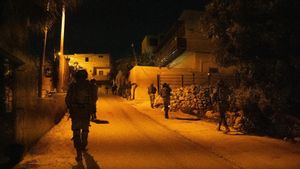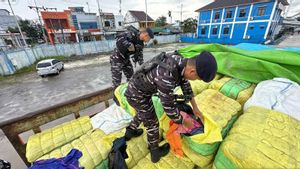JAKARTA - The United Nations (UN) human rights office on Tuesday said the Israeli siege of Gaza and evacuation orders in the region could mean forced transfer of civilians, violating international law.
UN human rights office spokesman Ravina Shamdasani said Israel did not seem to be making any effort to ensure evacuated civilians had proper accommodation, hygiene, health, safety and nutritional needs.
"We are concerned that this order, coupled with the implementation of a total siege of Gaza, may not be considered a valid temporary evacuation. Therefore, it will be a forced transfer of civilians who violate international law," he said in Geneva, Switzerland.
"Those who succeeded in complying with orders by Israeli authorities to evacuate are now trapped in the south of the Gaza Strip, with few shelters, fast supplies of food, little or no access to clean water, sanitation, medicines and other basic necessities," he said.
The term "force transfer" describes the forced relocation of civilian residents and is a crime against humanity punishable by the International Criminal Court (ICC).
Separately, the World Food Program (WFP) says its food supplies in Gaza are running low but they have inventory stores in the Egyptian city of Al-Arish, which is near Gaza.
Abeer Etefa, WFP Regional Communications Leader for the Middle East and North Africa said they hoped "to cross as soon as border access is granted."
"We call for access without a hitch, a safe path to the much-needed humanitarian supply to Gaza," he said.
It is known that the trucks carrying supplies to the Rafah crossing in Egypt are the only access routes to the enclave outside Israel's control, although it is not known for sure whether they can cross the border or not.
In addition to reducing food and water supplies, the health burden in Gaza has also reached a "peak spot", said UN Special Reporter Tlaleng Mofokeng.
VOIR éGALEMENT:
"The medical infrastructure in Gaza has been badly damaged and healthcare providers are in a dire situation, with limited access to medical supplies and conditions that do not allow them to provide timely and quality health services," Mofokeng said.
Meanwhile, the UN agency for Palestine, UNRWA said fuel supplies in all hospitals in Gaza are expected to last only 24 hours.
"The closure of the backup generator will endanger the lives of thousands of patients," the agency warned.
The English, Chinese, Japanese, Arabic, and French versions are automatically generated by the AI. So there may still be inaccuracies in translating, please always see Indonesian as our main language. (system supported by DigitalSiber.id)


















